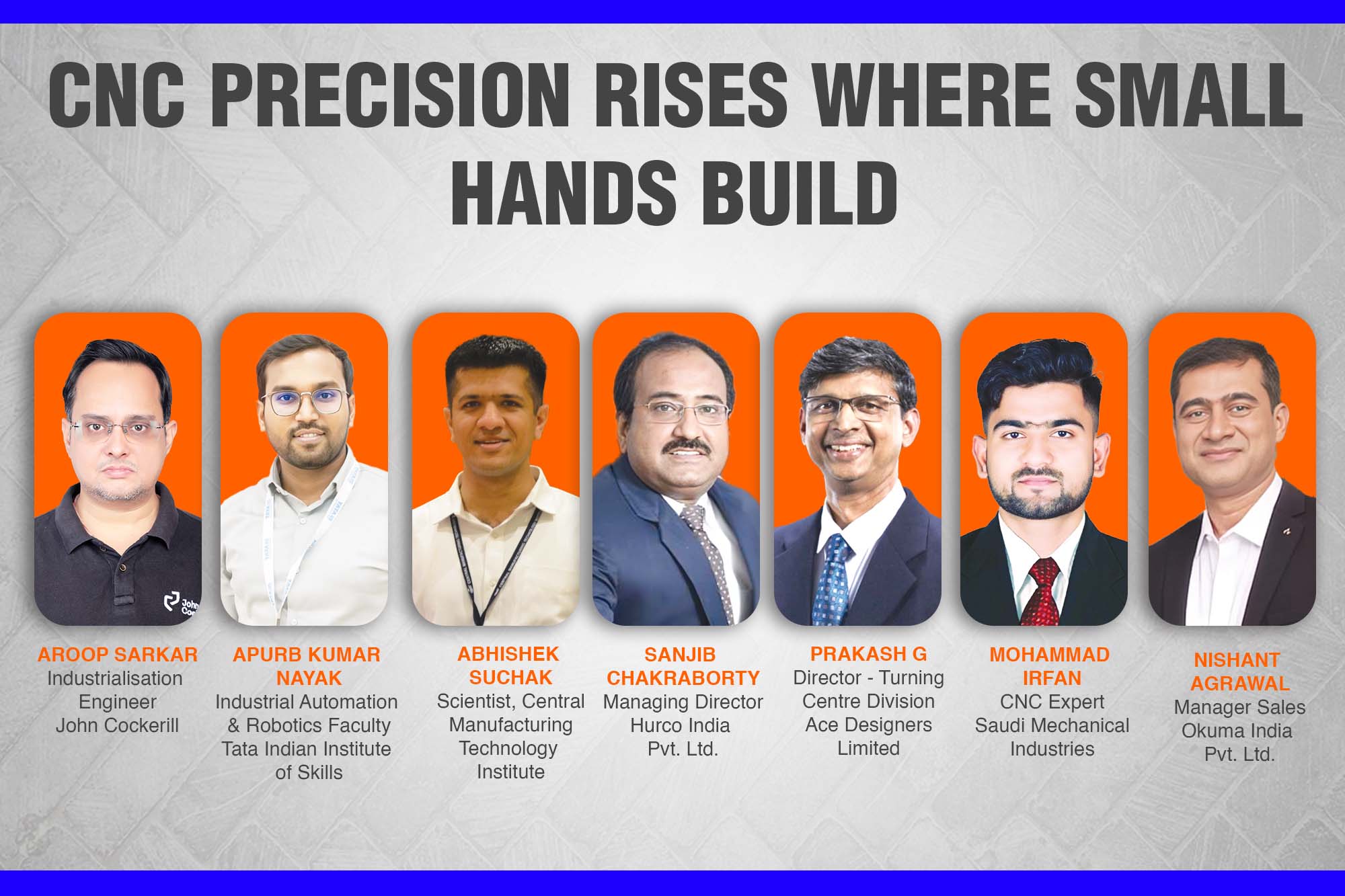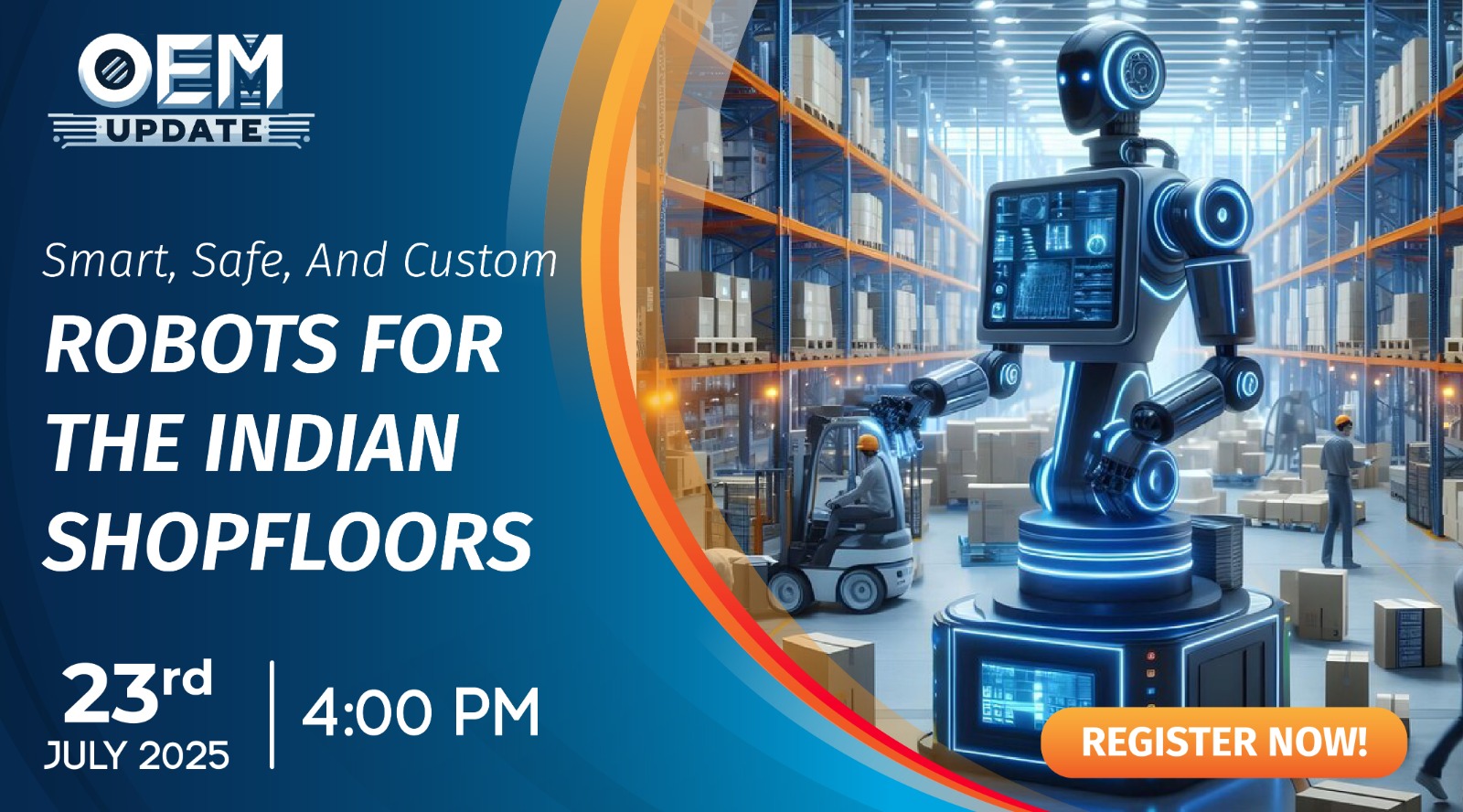Smart manufacturing is transforming the food and pharma
By OEM Update Editorial February 28, 2024 2:32 pm IST
Integrating AI, IIoT, and robotics accentuates the pharmaceutical and food & beverage sectors, enhancing efficiency, quality, and agility. The story explores AI-driven automation and promises a future of innovation and improved healthcare outcomes. It optimises production processes, reduces wastage, and enhances supply chain efficiency by leveraging automation, digitalisation and value-added services.
Integrating technologies like Artificial Intelligence (AI), the Industrial Internet of Things (IIoT), and robotics is reshaping automated systems, offering features such as predictive maintenance, real-time monitoring, and data-driven decision-making. This convergence enhances the reliability, efficiency, and flexibility of logistics and production processes.
Industries, particularly in Food & Pharmaceuticals, are increasingly turning to automation to boost efficiency, safety, cost-effectiveness, and product quality. In the pharmaceutical sector, technological advancements, particularly AI, are catalysts for transformation. Using automated technologies in pharmaceutical manufacturing brings many benefits, including increased efficiency, enhanced quality control, and compliance with regulatory requirements.
Automation also addresses supply chain disruptions and aptly adapts to changing consumer preferences. Companies can proactively identify bottlenecks, anticipate market trends, and optimise resource allocation through predictive analytics, real-time monitoring, and autonomous systems. In a dynamic market scenario, automation enhances supply chain visibility, optimises inventory management, and manages risks associated with disruptions.
Supply chain management
Supply chain disruptions and evolving consumer preferences are driving a revolution in supply chain management. Automation allows firms to improve supply chain visibility, optimise inventory management, and manage risks associated with disruptions such as delays in transportation, labour shortages, and unpredictable shifts in demand. Amol Bari, Head – of Services Business, Pilz India, remarks that using predictive analytics, real-time monitoring, and autonomous systems empowers companies to identify bottlenecks proactively, anticipate market trends, and optimise resource allocation.
Automation benefits supply chain management by improving efficiency, agility, and responsiveness. Simultaneously, it enables organisations to better cater to evolving consumer preferences in a rapidly changing market scenario. Given the dynamic business demands, customers consider automating processes for various reasons. They aim to improve productivity and reliability at the right price while maintaining quality and reducing waste.
Guru Prasad S, Assistant Vice President and Head – Industries, Robotics and Discrete, ABB India, thinks that businesses today need to have enough flexibility to support the continuation of the shift from making large volumes of the same product to making smaller lots of greater variety, i.e. ‘mass customisation’. Manufacturers are challenged to introduce new items with quicker turnaround times in various sectors with shorter product life cycles. Automation becomes essential to maintain facilities online, enhance performance, and reduce the cost of unscheduled downtime. The increased complexity in manufacturing is also driving investment in intralogistics automation systems.
Pharmaceutical and F&B automation solutions
Automation in the pharmaceutical and food and beverage (F&B) sectors ensures precise formulation, packaging, and labelling while adhering to safety protocols. Machinery safety is a top priority due to regulatory constraints and the intricate nature of production environments. Machine learning and real-time data transfer are indispensable tools in these industries to meet the demands of complexity and high output speeds. In the pharmaceutical and/or food and beverage (F&B) sectors, companies are leveraging automation to improve quality and streamline production processes, considering the complexity of operations and the need for high output speeds. Machine learning and real-time data transfer are indispensable tools to match these requirements, quips Guru Prasad.
The 2024 budget reflects the government’s commitment to promoting growth and innovation in the F&B industries and bio-manufacturing. The budget allocates infrastructure development, research & development, and skill enhancement resources. A new scheme for bio-manufacturing aims to incentivise investments in green technologies and renewable energy sources, aligning with the government’s focus on sustainable practices and innovation.
Progress in robotics and AI significantly influences packaging automation, offering enhanced precision, efficiency, and adaptability. Robotic systems integrated with AI-driven algorithms enable autonomous decision-making, adaptive learning, and predictive maintenance in packaging processes. Various robotics technologies, including articulated robots, collaborative robots (cobots), and autonomous mobile robots (AMRs), transform packaging operations quickly and accurately.The pharmaceutical sector is experiencing a fundamental shift in product formats, necessitating a reevaluation of production and packaging methods. Adopting machine learning and AI in robotics enables self-learning and self-adjustment, enhancing performance. The global packaging automation market is projected to grow steadily, reaching a high demand of US$ 161.66 Billion by 2033. Furthermore, the budget emphasises improving productivity and competitiveness in the F&B industries. It proposes measures such as modernising infrastructure, promoting technology adoption, and facilitating market access for small and medium enterprises (SMEs).
In 2024, the growth of automation in manufacturing is projected to persist steadily. Technological advancements, a focus on efficiency, and cost-effectiveness drive the evolution of industrial automation. With continuous developments in software solutions and robotics, automation is becoming more accessible and indispensable in manufacturing processes. Continuous software solutions and robotics developments make automation more accessible across diverse industries. The increased accessibility of automation is fueling adoption as manufacturers recognise its strategic significance in staying competitive.’
While the future of AI in pharma automation holds promise, challenges such as significant investments in technology, infrastructure, and employee training need to be addressed. The goal should be to integrate AI technologies to enhance human capabilities rather than displacing workers. AI is ushering in a new era of smart and efficient production processes in manufacturing, ensuring precise control over variables and enhancing overall manufacturing efficiency.
Quality control in pharmaceutical production is undergoing a paradigm shift with AI, employing computer vision and machine learning algorithms for detailed and speedy product inspection and analysis. Automation facilitates predictive maintenance strategies, minimising downtime by proactively identifying and addressing potential equipment issues.
Automation allows for the implementation of predictive maintenance strategies. It minimises downtime by identifying and addressing potential equipment issues before they lead to failures. It facilitates the collection and analysis of data from different stages of the manufacturing process, enabling companies to identify trends, optimise processes, and predict potential issues.
In conclusion, the future of pharma automation, driven by AI, holds immense promise. AI catalyses positive transformation from drug discovery to manufacturing and supply chain processes. The industry’s collective efforts to address challenges will determine how seamlessly and responsibly this evolution unfolds. The synergy between AI and human expertise will likely unlock unprecedented possibilities, ushering in a new era of innovation and improved healthcare outcomes. Pharmaceutical automation in manufacturing continues to evolve with technological advancements, ensuring the production of high-quality pharmaceutical products.
=====
Amol Bari, Head – Services Business, Pilz India Pvt Ltd.
Automation allows firms to improve supply chain visibility, optimise inventory management, and manage risks associated with disruptions such as delays in transportation.
Guru Prasad S, Assistant Vice President and Head – Industries, Robotics and Discrete, ABB India.
Companies leverage automation to improve quality and streamline production processes, considering the complexity of operations and the need for high output speed
Cookie Consent
We use cookies to personalize your experience. By continuing to visit this website you agree to our Terms & Conditions, Privacy Policy and Cookie Policy.
















